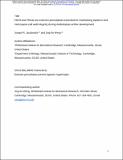PRX9 and PRX40 Are Extensin Peroxidases Essential for Maintaining Tapetum and Microspore Cell Wall Integrity during Arabidopsis Anther Development
Author(s)
Jacobowitz, Joseph R.; Doyle, William C.; Weng, Jing-Ke
DownloadSubmitted version (1.865Mb)
Open Access Policy
Open Access Policy
Creative Commons Attribution-Noncommercial-Share Alike
Terms of use
Metadata
Show full item recordAbstract
Pollen and microspore development are essential steps in the life cycle of all land plants that generate male gametes. Within flowering plants, pollen development occurs inside of the anther. Here, we report the identification of two class III peroxidase-encoding genes, PEROXIDASE9 (PRX9)and PRX40,thataregenetically redundantand essentialforproperanther and pollen development in Arabidopsis (Arabidopsis thaliana). Arabidopsis double mutants devoid of functional PRX9 and PRX40 are male sterile. The mutant anthers display swollen, hypertrophic tapetal cells and pollen grains, suggesting disrupted cell wall integrity. These phenotypes lead to nearly 100%-penetrant pollen degeneration upon anther maturation. Using immunochemical and biochemical approaches, we show that PRX9 and PRX40 likely cross-link extensins to contribute to tapetal cell wall integrity during anther development. This work suggests that PRX9 and PRX40 encode Arabidopsis extensin peroxidases and highlights the importance of extensin cross-linking during pollen development.
Date issued
2019-03-18Department
Whitehead Institute for Biomedical Research; Massachusetts Institute of Technology. Department of BiologyJournal
Plant cell
Publisher
American Society of Plant Biologists (ASPB)
Citation
Jacobowitz, Joseph R. et al. “PRX9 and PRX40 Are Extensin Peroxidases Essential for Maintaining Tapetum and Microspore Cell Wall Integrity during Arabidopsis Anther Development.” Plant cell 31 (2019): 848-861 © 2019 The Author(s)
Version: Original manuscript
ISSN
1040-4651
1532-298X
Keywords
Plant Science, Cell Biology